Archive
If I Checkout My Own Groceries Why Am I Not Being Paid or at Least Given a Discount?
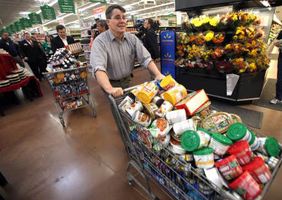
Foodie or regular shopper. Shopping solo, with a wing man or you have the whole bloody family with you. Let’s face it by the time you have selected your items, run the gauntlet of the perishable departments and pole vaulted over 2 dozen product displays strategically located in those narrow store aisles you the shopper are ready to get the heck out of the store. Now there is the rub. As you swiftly move across the front of your local supermarket pushing your loaded shopping basket with bad wheels frantically looking for the friendly face of a cashier to take the burden of checking out and bagging your purchases off of you suddenly you realize that there are no friendly faces available. Your choice is to wait in a long line behind other shoppers who have populated the 2 or 3 checkout lanes that are actually staffed at that particular moment in time or check your grocery purchases out yourself. Please note that there are now hybrid alternatives to the self-checkout of your groceries including a scan as you go device however in this post we will stick to the either or choice dilemma for ringing up your groceries.
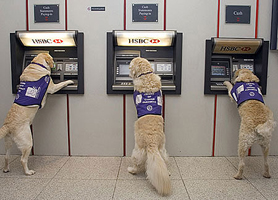
Some pundits might at this point begin to draw comparisons between the similarities of the history of retail banking ATM’s and self-checkout registers in the supermarket. I will briefly say that yes years ago one had to go into a bank branch to make deposits and make withdrawals. Waiting on-line was the norm however I believe the staffing levels in the banks back then were at a much higher level than let’s say a funeral home information booth at a run for life marathon. ATM’s at first allowed the consumer to have access to the cash in their respective accounts 24 hours a day 7 days a week. Yes this was a win for the consumer. No real heavy lifting here so to speak and no extra charges or fees. As time went by did the banks profit by reducing their branch staffing levels? Yes. Later as the consumers need for cash lessened even the ATM’s began to lose some of its luster in the eyes of the banking consumer. The two situations are different as I will now explain within the balance of this post.
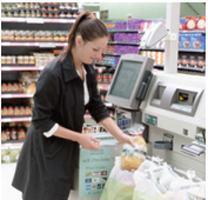
The basic point to be made in defense of the title of this post is that any customer in any supermarket that scans, bags and pays for their supermarket product purchases is saving that supermarket money by reducing the stores labor expenses. Yes a weak case can be made that with the initial capitalized costs of these self-checkout registers, $25 to $60 thousand each, along with their annual operating costs, there is no savings to the store. Again some might suggest that these upfront cost are more expensive than what it would take to staff a regular register with an employee and that the reason that stores deploy self-checkouts is really because of customer service demands. Well let me set everyone straight on the manned register versus self-checkout register expense point. It is my professional opinion, based on years of experience, that the majority of self-checkout register systems in use in today’s supermarket are less expensive to operate than a register manned by an employee. There is no other reason why the industry has embraced these machines except for the fact that it reduces their labor expenses.
Okay point number two. It is a fallacy to believe that supermarket chains, operators and business owners implement self-checkout registers because of the need to provide customer service. Let’s stop for a moment and revisit that last sentence. Now that we have taken a moment to digest this broad claim of mine let’s take a closer look at it.
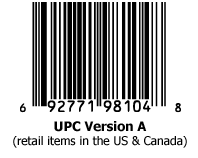
Once again if we all get into the proverbial time machine and go back to late 1970’s or early 1980’s we would see that most supermarkets and grocery stores did not have cash registers that scanned the bar codes or the UPC codes on products. Yes at that point in time a number of national and local chains had begun rolling out scanning cash register systems in their stores because the use of this technology would certainly reduce the time it took to ring up a customers order which in turn was a good thing for customer service. No one disagreed with this line of thought. One of the downsides in implementing bar code scanning in a supermarket was the upfront capital costs. Outside of the necessary electrical and communications wiring requirements, along with in most cases the checkout stands themselves which had to be replaced as well, a POS or Point of Sale cash register system could run as much as $10,000 per lane not counting the cost of back office support systems, hardware maintenance and weekly information updates. There were additional benefits to the retailer as well what with availability of sales and profitability reports by product and/or department. Detailed sales analysis in the supermarket at store level had finally arrived. Better and more efficient inventory levels were sure to follow, at least some thought so anyway.
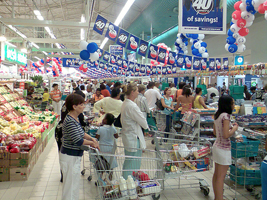
Okay so POS scanning systems slowly made their way into most main stream supermarket throughout the 1980’s and early 1990’s. Some more progressive thinking small independent supermarket operators also adopted this product scanning technology early on when the larger chains were implementing it but by the early 1990’s pretty much all supermarkets had either or where in the process of installing these new “computer” type cash register systems in their stores. They market was forcing all retailers to do this because the customer perceived this type of cash register system as a way to check out quickly at the end of their shopping trip saving them valuable time. Once again retailers benefited from this new cash register technology as well. The belief was that a cashier manning a POS scanning cash register could check out more customers per hour than a cashier who rang up each product by price. With less cashiers required to serve the customer at the front of the store than the labor savings achieved there meant more money/profit going to the bottom line. Of course there were many other benefits for a retailer implementing this technology but that discussion could fill a couple of posts on this blog and is not germane to this particular one.
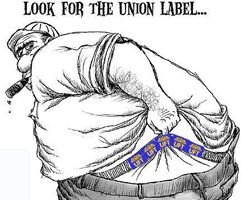
A small side note here back when bar code scanning systems were being implemented in the U.S. supermarket industry labor unions were up in arms about industry management using this new technology. The loss of union jobs was obviously a major reason for their position on challenging the use of these systems for it would lead to lower staffing levels in the store therefore less jobs for their members. Later when self-checkout cash registers began to be implemented in supermarkets there was even less hyperbole emanating from the unions concerning the loss of union jobs because of the reduction in their overall influence in the labor market.
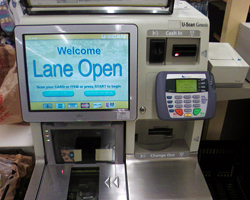
Okay so we can that in bringing bar code scanning cash registers into the supermarket the retail industry had served up improved customer service to their shoppers and at the same time achieved labor savings along with now having access to more detailed inventory/sales reports. To me this sounded like a win-win situation for everyone except organized labor. So now let’s take a closer look at the implementation of self-checkout cash register systems in the U.S. supermarket industry.
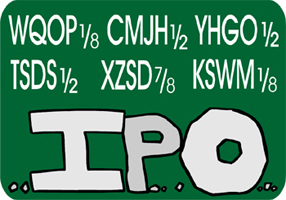
Even with the reduction in the presence and strength of organized labor in the U.S. supermarket industry labor costs were one of the three perceived menaces of profitability in the supermarket industry. The others, in no particular order, were the costs of goods or the how much the retailer paid for the products that they sold to their customers. The last threat was the cost of utilities services in a store. As some of you might remember from an earlier posts I believe it was a study by the University of Iowa that stated that 5% of the total consumption of electricity in the U.S. is by supermarkets. At the same time as the implementation of self-checkout cash registers the U.S. supermarket industry was going through a period of consolidation. Larger U.S. national chains were buying up regional supermarket chains. Foreign supermarket chains were buying up U.S. regional chains. Investors were demanding an even higher return on their investments as the technology industry boomed. From a historical standpoint most successful supermarkets of the day averaged a 1.7% net profit margin while the really successful ones averaged 2% or slightly higher of a net profit.
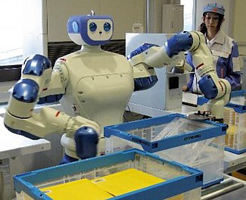
Retail technology vendors began to tease the CEO’s and CFO’s of the supermarket industry by peddling a potential cure for the increasing costs of labor in their checkout operations. This magic pill was the self-checkout cash register system. Just imagine company executives having an employee that never calls in sick, never requires health insurance, works without a break and never asks for a raise they chortled. Remember also that there is no possible way that these mechanical workers will ever ask to join a labor union. Of course these technology vendors had to convince these executives to swallow a tremendously high level of capital expenditures to achieve this labor cost nirvana but they also had a backup plan to get them on board. This plan was to pitch these new mechanical workers as a form of customer service! Yes these devices would be something that customers would be demanding, especially as these retail executives continued to trim the number of workers at the front of their respective operations, so everyone shouted with glee as they drank the Kool Aid.
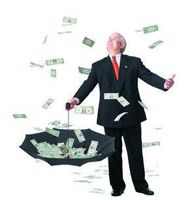
Obviously I have a certain predisposition to the issue of whether the retail food industry implemented self-checkout cash register systems for labor savings benefits or for customer service reasons – these two reasons are mutually exclusive. As the line in one particular movie went, sorry Kevin Coupe and Mike Sansolo for using the movies for business lesson, “do not piss on my back and tell me that it is raining”.

As a consumer just think of it. You are now ringing up the products that you are purchasing from the store. After ringing them up you are then putting these products in some type of bag that if applicable you will put back in your shopping cart and then take to your vehicle. The first two tasks that were normally done by the supermarket cashier is now being done by the shopper therefore saving the retailer labor costs. If there was a real human ringing up your purchases then there might possibly be an exchange of pleasantries between the two parties along with the potential of a retailer-customer relationship bond being formed. In some cases this bond could contribute to the customer loyalty factor that retailers crave but we will leave this subject on the side of the road for now.
So the point that I am making in the title of this particular post rings true. If I the customer am now doing the work that some employee in a store use to do then why am I not being compensated for my free labor in the form of a discount on my order or a credit on my next one. It is insulting from a customer service standpoint and it is just another example of how businesses today squander marketing and increased sales opportunities by implementing poorly thought out strategies. It is also indicative as to how supermarket retailers view their customers as a whole. Is it a pain to go into a store and do one’s shopping only to find out that there are only a few manned cash registers in which to checkout at? Of course it is. However to be herded over to the self-checkout registers, like lemmings to the sea, is just plain insulting. Worse yet is being told by the retailer that the only reason that they have these type of checkout systems is because that is what we the consumer clamored for. That is simply a lie.
TBC in another Post
AB
Copyright @ 2010 Supermarket Stories
Blackberry’s Are Not in the Produce Department and Can You Wait for Just a Minute I Have to Make a Call

Someone recently said that cell or smart phones are not the reason for a perceived increase in rude and ill-mannered behavior by some people in public. The fact of the matter is that these types of people act selfishly and rudely with or without the use of technology. We do not need to use a cell phone to explain why people today exhibit bad manners in public places because behavioral traits like these operate without the need for an electric charger.
Wander through the aisles of your local Supermarket and you will see, what appears at first, to be people talking with themselves. Then upon closer examination one realizes that these people are actually speaking to someone else on their cell phone through some sort of ear piece device. Cell Phones are a handy way for one’s wife, husband, significant other or elderly parent to get in touch with a shopper to ask them to pick up this or that since they are already at the store. If only this were the case in reality.
Listening to people talk on their cell phones in the supermarket can be an insight into our social norms or possibly a case study of conversations at a mental health clinic. For one particular group of shoppers, sorry young ladies, being at the Grocery Store seems to be the time that they can catch up on the gossip of what their fellow girl friends are doing and in some case doing it with. In the case of the busy 30 something male it is a chance to catch up on voice mails from the office or planning for the next sporting event. Every social group that I have observed talking on the cell phone in the Grocery Store have their own particular subject matter that needs to be talked about as they pickup the sodas, chips and frozen food. Why is this? Sociologists I am sure will have an answer and the statistics to back up a study on this type of behavior. Psychologist will have their perspectives on this subject and most of the rest of us will still go around scratching our heads as to why people feel the need to talk about things so loudly on the cell phone in public.
In the interest of full disclosure I own a cell phone or smart phone as they are referred to today. I have never really felt the need to wander through some public place and carry on a conversation with someone else at the same time. Remember though so far I have only been writing about customers using their cell phones in public at the Grocery Store.
So who says that Supermarket employees should be excluded from exercising a little bit of narcissistic tendencies on the job as well. I know for myself that they do so regularly and see it just about everyday or every time I go into a supermarket.
Let’s briefly go off the current subject matter for a moment so that I can provide some background as to why this socially rude and unacceptable behavior of using a Cell Phone at work in the Supermarket has been allowed to grow roots.
Technology is a wonderful thing in most cases. Technology allows for one to be more informed, in touch and have access to the volumes of the accumulated wealth of man. Years ago in many American business, not just the Retail Food industry, computers perpetuated the reduction in numbers of mid-level management positions in an organization. In older businesses the executives would set policies, then area directors would package them for use by the managers who in turn would supervise those policies implementation and adherence to by the line employees. Whether this was a manufacturing, traditional office or service operation mid-level management were the supervisory Bee’s in the business colony.
Technology, namely computers of all different sizes and capabilities, allowed executives to monitor productivity and the operations of a business at all levels. In the interests of cost savings and organizational profitability it was determined that there was too much mid-level management in place. More managing could be done with less management and more technology. Executives could have their finger on the pulse of an organization all of the time. Anyway this change in the organizational thought process worked its way through every industry in the United States even the humble Supermarket Business.
Depending on the size of a particular Grocery Store the organizational structure use to include a store manager, assistant managers, department heads, office personnel, inventory clerks, front-end supervisors, cashiers and perhaps someone to load your purchases into your car. Well to the owners and executives of the Grocery Stores this was just too many people to have on the payroll. Right Uzzi? After all the owners and executives now had the technology to manage every aspect of the business. They did not need someone else interpreting results for them or even carrying out some policy because they could do this themselves or through others further down the organizational chart. In addition the age of hello e-mail good-by personal visits by a mid-level managers was dawning.
So the Supermarket Industry went through an organizational change at store level. First store managers, through the use of technology, could do more to monitor the different areas of their stores. They did not need 3 or 4 assistant managers to help in the running of the store, now they just needed a couple of assistants. The need for multiple department heads was no longer needed either because technology has proven to the owners that the Dairy Department Manager can also be the Frozen Food Manager. Instead of having a pseudo bookkeeper at the store the computer would keep track of things and flag any exceptions which now the store manager must look into first. Front-end Supervisors became more and more extinct in most stores. Instead an office type person can help the cashiers or attend to the odd customer inquiry now and then. Cashiers can be cashiers or Self Checkout Registers can even eliminate the need for the number of cashiers as well – more on this in another post. The store can now reduce their over all store payroll by two to four percent. Considering that a Grocery Store can have a payroll of 7 – 14 percent of its total retail sales the savings are huge. So fewer eyes and more technology was the answer to a store’s profit and service be damned just ask the Holy Grail of retailing Wal-Mart.
So now we can better understand why in some cases no one is watching the proverbial store anymore – other than the closed circuit cameras that are for the most part not being monitored just recorded, the store is on its own as are the customers.
The other day I was in one of the Uzzi Family company stores and I noticed that a cashier, a young man, seemed to be fidgeting with something or with himself while he was waiting on a customer. Of course my thoughts were that perhaps the customer is really a robber and threatening the young cashier. However upon closer observation I saw that the cashier was still checking out or scanning a customers order it was just that the customer was not really putting the products on the check stand with any particular sense of speed. Heck there was not even a rhythm to this process for this customer was just slow putting things on the checkout belt.
This cashier apparently felt that he could use these snippets of 10 or 15 seconds between the groups of products being dug from the customers cart to carry on a Text Messaging conversation with someone who he knew. How’s about that? This cashier certainly practices some type of extreme time management if you ask me.
In the past I had noticed that even at my own local supermarket younger cashiers almost always seemed to have their cell phone or smart phone within close proximity to where they are working. Occasionally I would hear a ring tone similar to a Lady Gaga hit single or some other current R&B or Hip Hop artist going off in the employees pants pockets or purses that were placed under the counter of their workstation. I also noticed that if an opportunity presented itself either after the customer had finished checking out or before the next customer’s order was completely placed on the Checkout Belt that the cashier would reach for the phone and see either who it was that called earlier or what the Text Message said that just came in. There have been times where I have seen the cashier either respond to the Text Message or make a quick phone call before checking out the next customer.
I must be sensitive to this type of behavior now because I see it more and more in the retail stores that I am in. The points that I would like to make here with this post is that rude behavior and poor manners do not need technology to bring it out into the open. If people acting like this today were allowed to do these things and act like this growing up it certainly was something that the parents failed to communicate to their children as to what is acceptable and what is not acceptable forms of behavior. It is not up to the schools or businesses to be surrogate parents and teach their employees not to be rude however the businesses should always provide good examples of proper behavior. However it is up to the schools and the businesses to let their students or employees know what the rules are along with the consequences of not following them. Hello kids do you want fries with that order.
The second point that I would like to make here is that with the lack of supervision in more and more Supermarkets today it is not surprising to see that this type of rude behavior and employee malaise can occur. Store owners and management have an obligation to their customers to provide food products in a clean and sanitary environment with efficient and effect service at a reasonable price. No more and no less. Without proper supervision and periodic associate reviews that include addressing behavioral traits these forms of rude behavior will continue to find fertile ground in the supermarket.
As an aside it is not just the cashiers who are using their cell phones whenever they want to at work it is also the cart person, the meat cutter and the person behind the deli counter. At times I have heard more colorful language emanating from behind the counter from my location on the sales floor than I have heard in some bars.
Quickly to give Uzzi some credit he has a very strict policy on the use of cell phones in a store while an employee is on the company’s time or as he says his time. This policy requires that the employee not use their cell phone when they are working or on the sales floor only when they are on break or leaving for the day. Of course you always see Uzzi when he is in any of the stores with his cell phone at his ear but I guess that he is using it for company business – yea right.
It was only 10 years ago or so that if someone mentioned or used the word Blackberry in a Supermarket one would think of a particular type of fruit berry in the Produce Department. Today one’s first thought is of that famous type of smart phone. Oops I have to run now because I just got a Tweet from Paris Hilton and I want to read it right away.
AB
Copyright @ 2010 Supermarket Stories
Recent Posts
Categories
Archives
- November 2010 (2)
- October 2010 (10)
Calendar of Posts
| S | M | T | W | T | F | S |
|---|---|---|---|---|---|---|
| 1 | ||||||
| 2 | 3 | 4 | 5 | 6 | 7 | 8 |
| 9 | 10 | 11 | 12 | 13 | 14 | 15 |
| 16 | 17 | 18 | 19 | 20 | 21 | 22 |
| 23 | 24 | 25 | 26 | 27 | 28 | 29 |
| 30 | ||||||